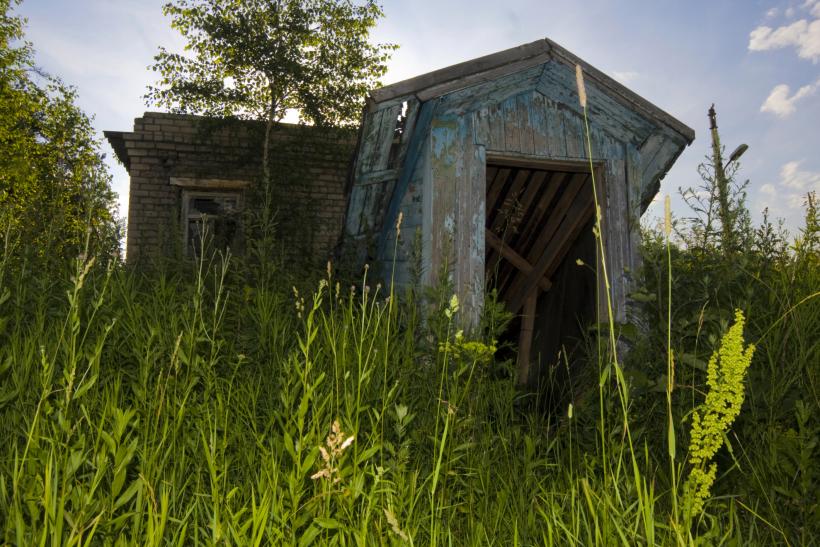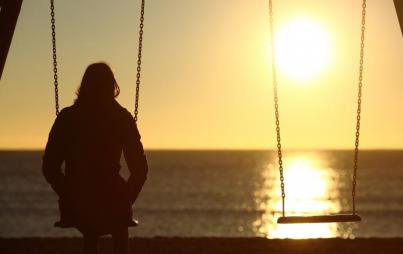
Credit: Thinkstock
It was summer, late afternoon, the time of day when all the bugs swarming above the grass carbonate the air with specks of floating light. I’d be leaving in a couple days to start college, but right now I was sitting on a back porch that wasn’t mine, watching wasps chew the wooden steps, and petting a black and white cat along half-starved ribs.
I wanted a beer. This was saying something, since I didn’t drink, and still don’t. But that afternoon, I was thinking of this place before the grass grew tall and seeded, before the wasps took over the eaves. What made the place eerie now were the objects they’d left behind, as if they’d fled the house right before a hurricane. As if they hadn’t known they’d be leaving. It was enough to make my skin prickle in the heat – the intimate but inanimate presence of those abandoned things.
In the kitchen window, a red, glass heart still hung to catch the light. Every now and again when the breeze lifted, I could hear it tap-tapping against the broken pane. Strewn about the unlocked porch were a bunch of cracked and rusted things, like a wave had tumbled over the house and left a wash of wreckage in its wake. I could make out a decapitated lamp. Some water-stained books.
My mom slammed the door to our minivan and picked her way over the ruined drive. She set a bowl down next to the cat, and it began to eat so fast we could hear it gasping for air.
“Poor thing,” she said, stroking it between the shoulder blades, “So hungry.”
Over the years, my mom had become the resident cat rescuer in our town. Anytime a stray wandered in, she was the one people called. She knew how to lure them with food, knew how to trap them, but mostly, she knew how to sit quietly and talk to them. Once, a cat she’d found a home for bolted and got lost, and she spent a whole summer papering telephone poles and calling his name out her car window. She even consulted a telepathic communicator to find him. And she did.
“These people never treated their animals right.” She sighed as she filled up another bowl with water and set it down. “You remember that dog they used to have? Always tied up to the garage.”
I remembered Daisy May—a giant black lab forever lunging against the line. Back when we were kids, Gabriela loved her, but I hated her; I still had a ribbed scar just under my eye where a dog had bitten me. One day though, Daisy May broke her leash and ran away. Gabriela cried, but she seemed to already know that that was it. She didn’t know the whole of it, but she definitely knew that no one was going to go search for her dog.
I looked around. There was the dip in the lawn we used to roll ourselves down, knees and elbows rubbed green. Years ago, I’d lost a necklace there, somewhere in the hissing grass. Farther up was the spot they used to put an inflatable kiddie pool in summer. One time, we found a snake, a tiny, black garter barely wider than a pencil. We picked it up, then screamed and dropped it into the pool where it swam back and forth, its rope of a body making rapid squiggles, as if writing dark cursive against bright blue.
I don’t remember how we had become friends. I was a bookish tomboy—Gabriela could barely read. All the boys at school either ignored me or tried to make me laugh so hard I hiccuped, but they forgot how to form syllables at the sight of Gabriela’s copper skin and copper hair, the rakish gaps in her smile where she had lost her eye teeth early.
At snack nearly every day, we shared the brownie from her lunch box. It wasn’t the kind of brownie my mom baked—it was the dense, mass-produced kind that we could break precisely in two along the groove a machine had punched in the middle for just this purpose. I ate my half slowly, a dark, sugary communion.
That was before my mom took Gabriela’s mom to the doctor, then forbade me to ride in their car. Before Gabriela kissed the boy I’d pined after for years. Before I left our shitty junior high for a better school. Before it finally came out, that June we both graduated high school, that her mom was using, had been for years, probably still was now after the family broke apart and scattered to different counties, leaving the things they didn’t want anymore or could no longer bear.
All summer long, the grass out back just grew.
“We’ll be back tomorrow,” my mom said, stroking the cat’s ears. She was taking her time, making sure the cat trusted her before she tried to bring it home. We picked up the bowls and got in the minivan. The cat watched us go, slapping its tail against the porch step.
Other people live in that house now; there’s a trellis of flowers next to the porch. But as far as I’m concerned, there will never be any way to cut through all that grass. Years from now, it’ll still be growing fast and long the way it grows in the most deserted places right through the bleached bones of animals, the way it grows in summer even when there’s been no rain.







